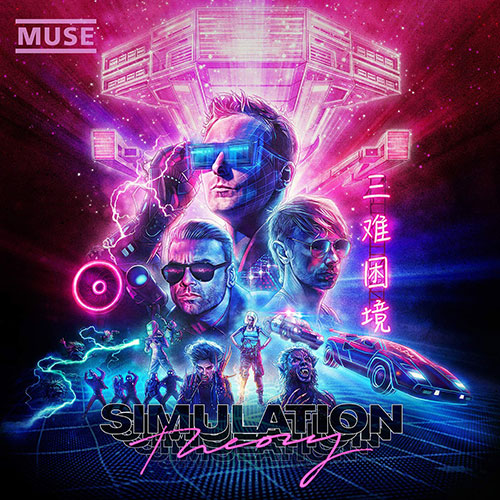
1. Algorithm
2. The Dark Side
3. Pressure
4. Propaganda
5. Break it to Me
6. Something Human
7. Thought Contagion
8. Get Up and Fight
9. Blockades
10. Dig Down
11. The Void
There’s clearly a glitch in the matrix. Muse, those dark, bombastic space-rock harbingers of war, global catastrophe and top-level corruption, have suddenly rebooted as a tongue-in-cheek retro synth-rock band. Recent videos spoof Tron, Teen Wolf, Back To The Future and Gremlins; the sleeve to eighth album Simulation Theory faithfully mimics a Blade Runner film poster. It’s as though Muse have re-skinned for a more fun, retro-comic play-through.
The wider concept – following albums revolving around mechanised remote control warfare (Drones) and global resource depletion (The 2nd Law) – is more knockabout too: the idea that we all actually live in a virtual reality simulation. And Muse twist the idea to create their own Sgt Pepper ‘character’ album. A virtual band-within-a-band, they’re 21st-century rockers transforming themselves into an 80s synth-rock simulation, and playing around with the sonic toys that entails: Vangelis synth throbs and sizzles; Jacko funk falsettos; the sort of gated-reverb drums you can’t hear without picturing an underlit Phil Collins.
Muse mainman Matt Bellamy characteristically used the conceit to explore the sinister side of the erosion of humanity. Algorithm, a krautrock-ish march merging symphonic menace with the proto-electro sounds of Jean-Michel Jarre, discusses the philosophical impact of mankind being superseded by technology: ‘Algorithms push us aside, render us obsolete,’ he wails. ‘This means war with your creator.’ Both the engrossing disco-Queen shimmy The Dark Side and Propaganda, a brilliant sci-fi R&B epic involving comedy Bee Gees backing vocals and an evil AI singing the chorus – speak of wanting to break free of a ‘dark fantasy world’, as though Bellamy feels that Simulation Earth has gone dangerously awry.
The pretence also gives Muse a postmodern excuse to have a crack at being the rock band that breaks back into the mainstream, integrity intact. So Simulation Theory treads a thin line between cheesy chart-chasing (Get Up And Fight’s Imagine Dragons buzz-rock; the EDM Winner Takes It All that is Something Human) and genuinely innovative pop rock: Pressure is a fantastic, hyperactive Supermassive Black Hole, while Break It To Me is a revelation, all junkyard industrial rock, R&B crackles, Arabian melodies and sci-fi DJ scratching bits.
Like Tranquility Base Hotel + Casino did for Arctic Monkeys, this sonic blue pill wipes Muse’s stylistic slate clean. Next time there’s no telling what avatars they’ll adopt.

